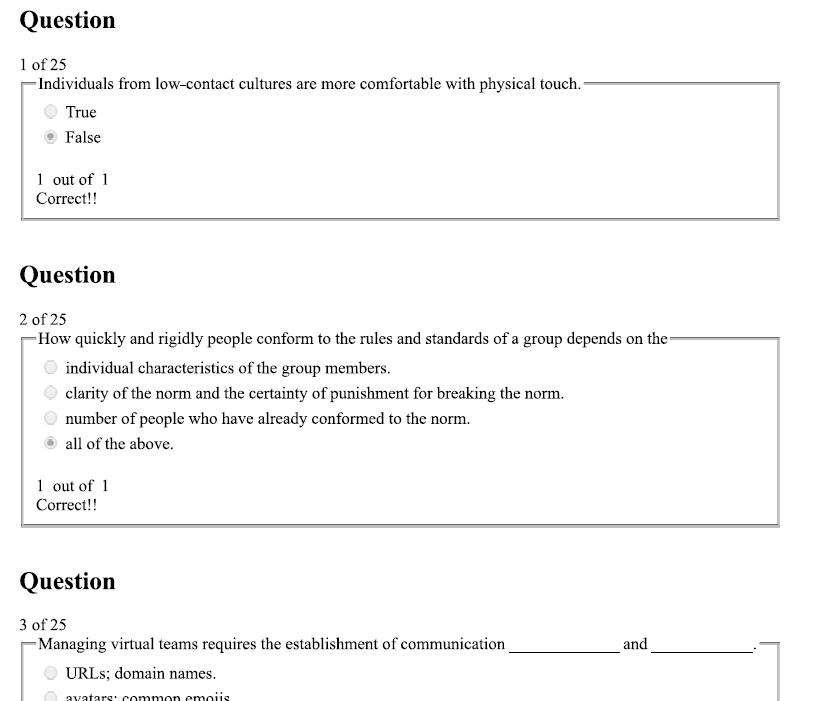(Solved): COM 230 Lesson 5 Quiz : Total Score 25 out of 25 , 100%...
COM 230 Lesson 5 Quiz
Total Score 25 out of 25, 100%
Question
1 of 25
Individuals from low-contact cultures are more comfortable with physical touch.
- True
- False
Question
2 of 25
How quickly and rigidly people conform to the rules and standards of a group depends on the
- individual characteristics of the group members.
- clarity of the norm and the certainty of punishment for breaking the norm.
- number of people who have already conformed to the norm.
- all of the above.
Question
3 of 25
Managing virtual teams requires the establishment of communication ___________ and __________
- URLs; domain names.
- avatars; common emojis.
- ground rules; expectations
- leaders; followers.
Question
4 of 25
Speaking faster in a diverse intercultural group helps members acclimate.
- True
- False
Question
5 of 25
People who function in monochronic time are more comfortable with doing only one activity at a time.
- True
- False
Question
6 of 25
The power of attractiveness, likeability, and charisma is _____________ power.
- legitimate
- referent
- expert
- coercive
Question
7 of 25
Roles may only be formally assigned
- True
- False
Question
8 of 25
Norms do not reduce the uncertainty that occurs when people congregate.
- True
- False
Question
9 of 25
Task leader, information gatherers, and devil's advocate are each a part of
- individual roles.
- task roles.
- maintenance roles.
- individualistic roles.
Question
10 of 25
If you understand how group roles form and how various roles function, you will be better able to help a group achieve its purpose.
- True
- False
Question
11 of25
A major challenge for teams composed of speakers of different languages is that the building of trust and relationships is largely language dependent.
- True
- False
Question
12 of 25
A blocker, an aggressor, and a help seeker are key group task roles.
- True
- False
Question
13 of 25
One of the most powerful forces drawing people into groups is the attraction of high status.
- True
- False
Question
14 of 25
Achieved status is what an individual acquires because of
- exercise of knowledge.
- ability and talent.
- skill and perseverance.
- all of the above.
Question
15 of2 5
Task roles are important because they
- help accomplish a group's task.
- define a group's social atmosphere.
- call attention to individual contributions.
- work towards enhancing interpersonal relationships.
Question
16 of 25
High-context cultures emphasize nonverbal communication while low-context cultures emphasize verbal expression.
- True
- False
Question
17 of 25
Norms develop in a group based on
- group members' experiences in previous groups.
- pop culture.
- actions that happen late in a group's existence.
- mental collusion.
Question
18 of 25
People who fuss and complain are the best at building and maintaining relationships.
- True
- False
Question
19 of 25
Raising your hand to speak in a classroom is an example of a norm.
- True
- False
Question
20 of 25
Facilitator, gatekeepers, and recorders are each a part of
- individual roles.
- task roles.
- procedural roles.
- individualistic roles.
Question
21 of 25
Culture impacts the roles and norms when it is especially
- similar.
- divisive.
- young.
- diverse.
Question
22 of 25
Social status refers to the ___________ that an individual has in the eyes of others.
- standing wealth
- relative standing
- verified intelligence
- sensitive spirit
Question
23 of 25
The encourager is a social-emotional role that creates a safe environment for others to share ideas and offer suggestions.
- True
- False
Question
24 of 25
Each response you receive from team members, outside consultants, or individuals contacted for information, deserves a reply of gratitude.
- True
- False
Question
25 of 25
Respecting the E-mail addresses of others means
- refraining from giving out other's addresses without permission.
- sending spam as necessary.
- invading their virtual personal space with constant communication.
- ignoring their email address.
Expert Answer

Buy This Answer $15
-- OR --
Subscribe $20 / Month
